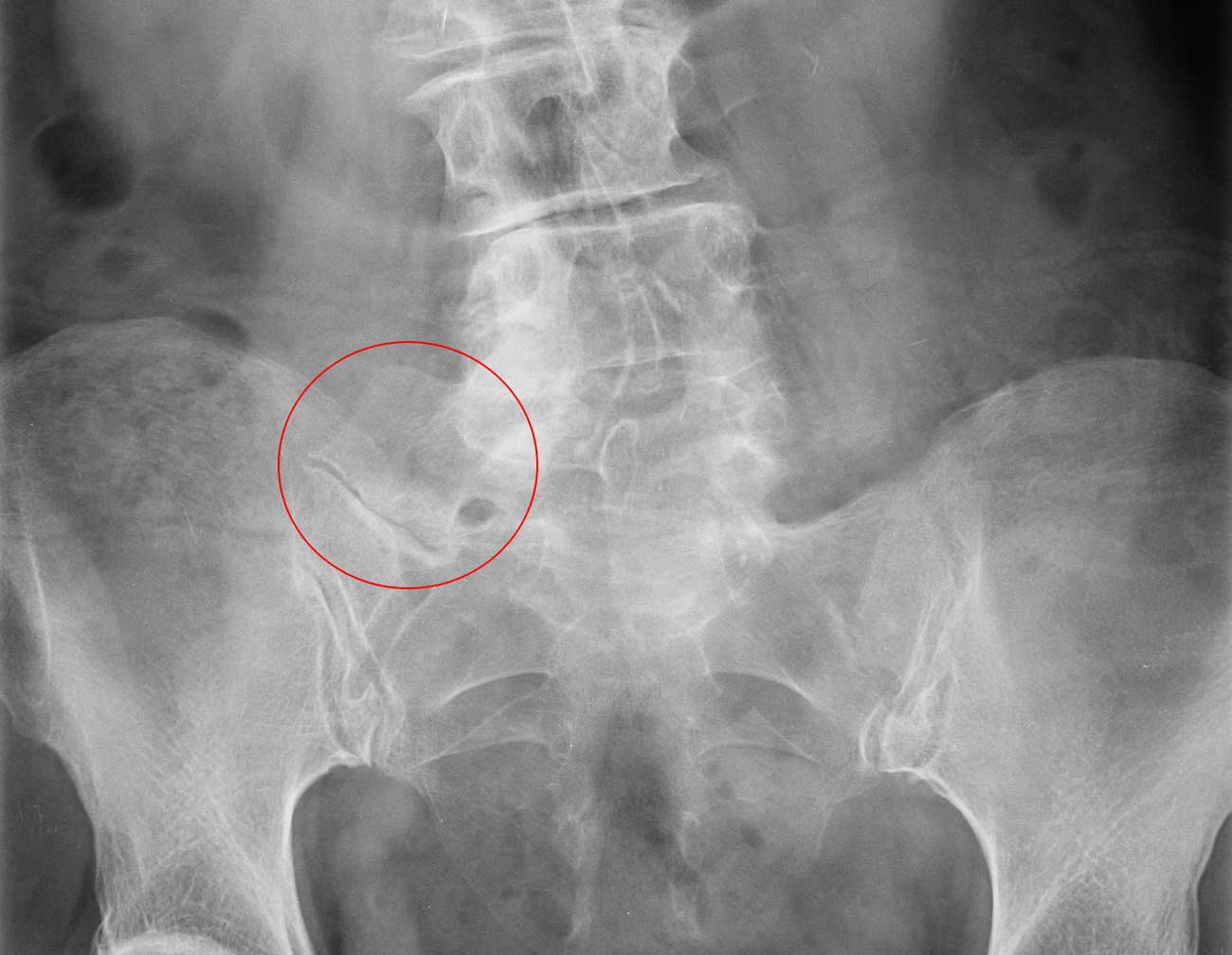Bertolotti's syndrome
Editor-In-Chief: Prab R Tumpati, MD
Obesity, Sleep & Internal medicine
Founder, WikiMD Wellnesspedia &
W8MD medical weight loss NYC and sleep center NYC
| Bertolotti's syndrome | |
|---|---|

| |
| Synonyms | N/A |
| Pronounce | N/A |
| Specialty | N/A |
| Symptoms | Lower back pain, sciatica |
| Complications | Chronic pain |
| Onset | Typically in adulthood |
| Duration | Chronic |
| Types | N/A |
| Causes | Lumbosacral transitional vertebra |
| Risks | Genetics, congenital |
| Diagnosis | X-ray, MRI |
| Differential diagnosis | Herniated disc, spinal stenosis |
| Prevention | N/A |
| Treatment | Physical therapy, pain management, surgery |
| Medication | NSAIDs, analgesics |
| Prognosis | N/A |
| Frequency | 4-8% of the population |
| Deaths | N/A |
Bertolotti's Syndrome is a rare spinal condition that is characterized by an abnormal enlargement or elongation of the transverse process of the last lumbar vertebra, which either fuses with the sacrum or the ilium or forms a pseudoarticulation with these structures. This condition was first described by Italian radiologist Mario Bertolotti in 1917, hence the name Bertolotti's syndrome. It is sometimes associated with lower back pain, although the presence and severity of symptoms can vary significantly among individuals.
Symptoms
The primary symptom of Bertolotti's syndrome is lower back pain, which can range from mild to severe. The pain may be localized to the lower back but can also radiate to the buttocks and thighs. Other symptoms may include stiffness in the lower back, limited range of motion, and discomfort when bending or twisting. In some cases, individuals may experience no symptoms at all, and the condition is discovered incidentally during imaging tests for other reasons.
Causes
Bertolotti's syndrome is caused by a congenital anomaly, meaning it is present at birth. The exact cause of the enlargement or elongation of the transverse process is not fully understood, but it is believed to be a developmental abnormality. The abnormal articulation or fusion can lead to altered biomechanics in the lumbar spine, contributing to the development of symptoms.
Diagnosis
Diagnosis of Bertolotti's syndrome typically involves a combination of clinical evaluation and imaging studies. A detailed medical history and physical examination are essential to rule out other causes of lower back pain. Imaging tests, such as X-rays, magnetic resonance imaging (MRI), or computed tomography (CT) scans, are used to visualize the anatomy of the lumbar spine and identify the characteristic features of Bertolotti's syndrome.
Treatment
Treatment for Bertolotti's syndrome is primarily conservative and focuses on managing symptoms. Options may include:
- Physical therapy: Exercises to strengthen the muscles around the lumbar spine and improve flexibility can help alleviate pain and improve function.
- Pain management: Nonsteroidal anti-inflammatory drugs (NSAIDs), analgesics, or muscle relaxants may be prescribed to reduce pain and inflammation.
- Corticosteroid injections: Injections into the pseudoarticulation may help reduce inflammation and pain in some cases.
In rare instances where conservative treatments fail to provide relief, surgical intervention may be considered. Surgery may involve resection of the abnormal transverse process or fusion of the affected vertebrae to stabilize the spine.
Prognosis
The prognosis for individuals with Bertolotti's syndrome varies. Many people respond well to conservative treatment and are able to manage their symptoms effectively. However, some may experience chronic pain and require ongoing management. Early diagnosis and treatment are crucial to improving outcomes and quality of life.
Epidemiology
Bertolotti's syndrome is considered a rare condition, although its exact prevalence is unknown due to the fact that many cases are asymptomatic and go undiagnosed. It can affect individuals of any age but is typically identified in young adults.
| Syndromes | ||||||||||
|---|---|---|---|---|---|---|---|---|---|---|
This syndrome related article is a stub.
|
Transform your life with W8MD's budget GLP-1 injections from $125.
W8MD offers a medical weight loss program to lose weight in Philadelphia. Our physician-supervised medical weight loss provides:
- Most insurances accepted or discounted self-pay rates. We will obtain insurance prior authorizations if needed.
- Generic GLP1 weight loss injections from $125 for the starting dose.
- Also offer prescription weight loss medications including Phentermine, Qsymia, Diethylpropion, Contrave etc.
NYC weight loss doctor appointments
Start your NYC weight loss journey today at our NYC medical weight loss and Philadelphia medical weight loss clinics.
- Call 718-946-5500 to lose weight in NYC or for medical weight loss in Philadelphia 215-676-2334.
- Tags:NYC medical weight loss, Philadelphia lose weight Zepbound NYC, Budget GLP1 weight loss injections, Wegovy Philadelphia, Wegovy NYC, Philadelphia medical weight loss, Brookly weight loss and Wegovy NYC
|
WikiMD's Wellness Encyclopedia |
| Let Food Be Thy Medicine Medicine Thy Food - Hippocrates |
Medical Disclaimer: WikiMD is not a substitute for professional medical advice. The information on WikiMD is provided as an information resource only, may be incorrect, outdated or misleading, and is not to be used or relied on for any diagnostic or treatment purposes. Please consult your health care provider before making any healthcare decisions or for guidance about a specific medical condition. WikiMD expressly disclaims responsibility, and shall have no liability, for any damages, loss, injury, or liability whatsoever suffered as a result of your reliance on the information contained in this site. By visiting this site you agree to the foregoing terms and conditions, which may from time to time be changed or supplemented by WikiMD. If you do not agree to the foregoing terms and conditions, you should not enter or use this site. See full disclaimer.
Credits:Most images are courtesy of Wikimedia commons, and templates, categories Wikipedia, licensed under CC BY SA or similar.
Contributors: Prab R. Tumpati, MD


